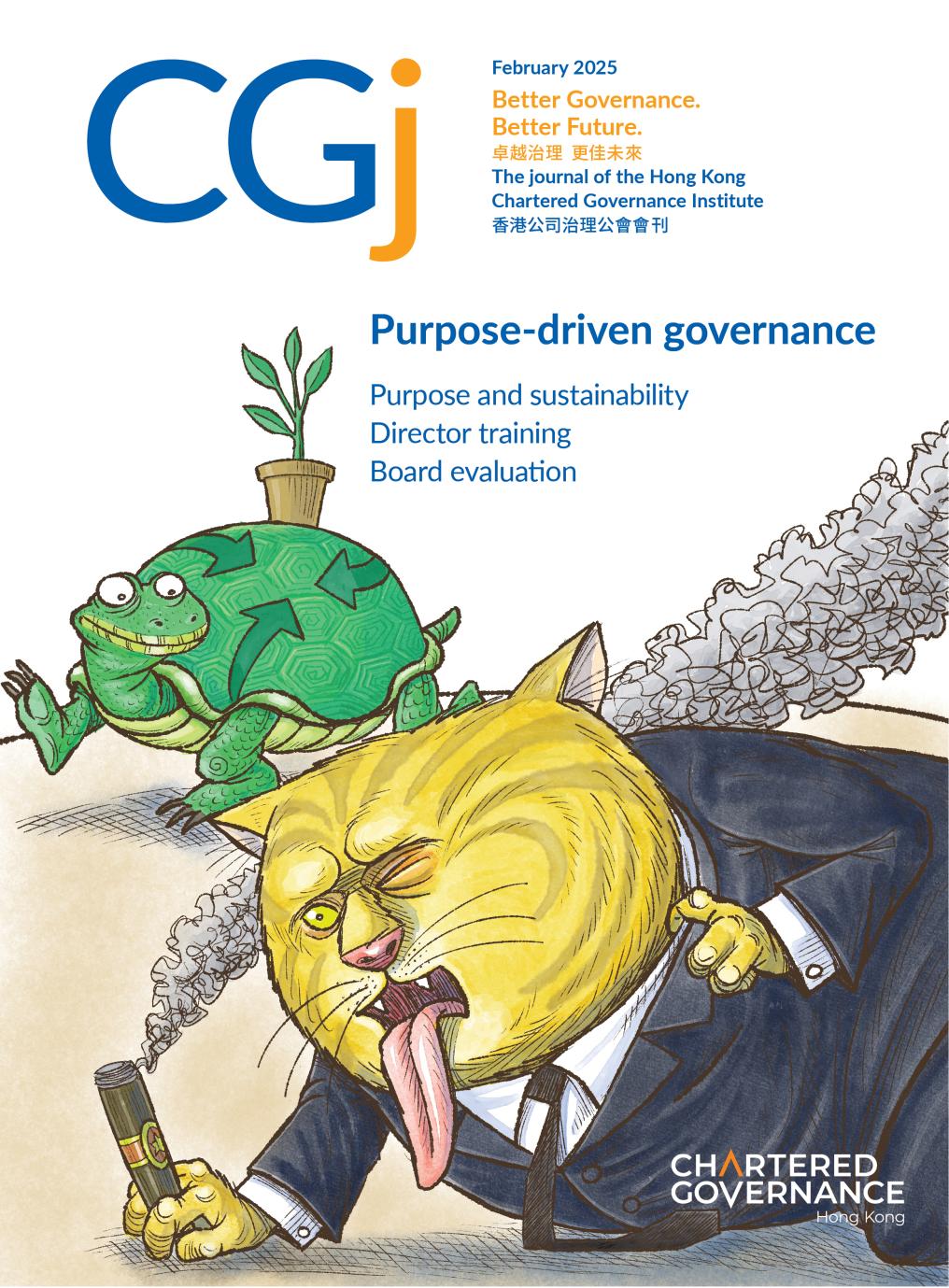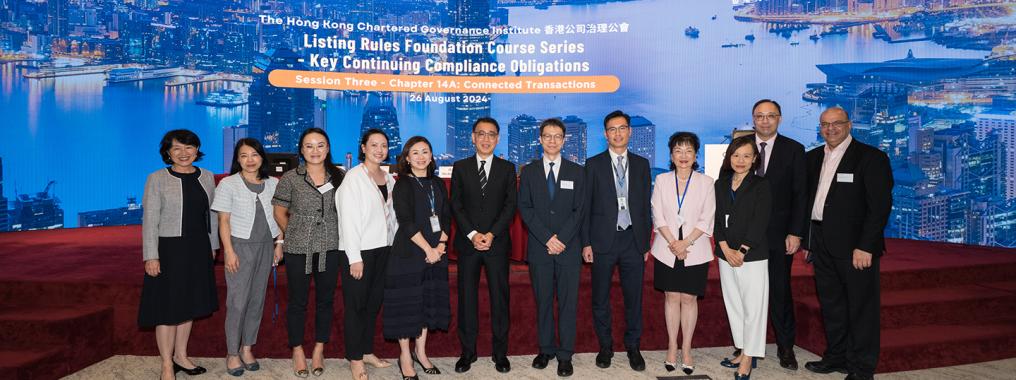In this month’s GoldenGen Reflections series, which features senior members of the governance profession, CGj talks with Louisa Lau FCG HKFCG, former Registrar of the Institute’s Secretariat.
When and how did you first join the Institute as a member?
‘I first became an Associate member of the Institute in 1987, after completing the exams set by The Institute of Chartered Secretaries and Administrators of London, as The Chartered Governance Institute was then known. This was even before the formal establishment of the Institute, which happened in 1990.
When did you join the Institute in a professional capacity, and what was your career trajectory?
‘I joined the Institute on a part-time basis in 1995 as Institute Secretary and was involved in a wide range of initiatives, such as supporting the Education (now Qualifications) and Membership committees, as well as office administration. That was a very transformative time for me. However, I left the Institute for a brief period to pursue other interests, but later returned to the Secretariat in the early 2000s and became the Director of Administration & Operations in July 2003. I was elected as a Fellow in 2007, which marked a significant development in my career. In January 2024, I retired as the Registrar of the Institute, having held that position for nine years. It was certainly very fulfilling to be part of the Institute’s growth during my tenure.’
Can you share some of your own personal golden memories of the Institute’s early days?
‘One of my earliest and most memorable experiences was in 1995, very soon after I joined the Secretariat, and had only 11 days to prepare for a major career exhibition. I remember scrambling to organise the booth and promotional materials. It was a challenging yet rewarding experience that highlighted the dedication and teamwork within the Institute. Another fond memory was helping H share company secretaries and board secretaries from the Chinese mainland with their training. It was my first exposure to the H share market and it helped me gain a greater understanding of the Institute’s role in promoting governance practices.’
What would you say are some of the most significant milestones in the Institute’s history?
‘I think one of the most pivotal moments came in 2004, when we underwent significant changes in our governance structure, in terms of shifting from being a more traditional professional body to becoming a more dynamic, forwardthinking organisation. The decision to introduce a new framework for our Council and committees really transformed how we operated and how we positioned ourselves in the industry.
The Institute’s continuing professional development programme was also formally established in 2004, which elevated the calibre of our qualifications and training. In addition, we launched our International Qualifying Scheme examinations, which served as an important route to qualification in our profession and later to membership of the Institute. I was personally involved in the conversations with local universities and higher education institutions that led to a close collaboration regarding various master and undergraduate programmes. We had to work hard to establish credibility and to tailor programmes that would meet both professional and academic standards.
In addition, we began engaging more with the Chinese mainland in 2004, which opened doors for cross-border cooperation, particularly with the stock exchanges. I remember when we started our Affiliated Persons programme, which included a number of structured training courses for H share company secretaries and board secretaries. That was a breakthrough moment for the Institute, as it helped establish our presence in the mainland market. I was personally involved in the early days when we were building those relationships. These events helped set the direction for the Institute’s growth and contributed significantly to its global recognition.’
What advice would you give to the younger generation starting out in their governance careers?
‘My advice is to embrace a continuous learning mindset. Understand that, while rules are fundamental, it is vital to develop the ability to adapt quickly to change. Corporate governance isn’t just about the law and regulations – it originates in management. Companies themselves need to evolve, so you should always be observant and aware of any changes.
In the past, our roles as company secretaries were often seen as something that was done behind the scenes, but now, with governance professionals playing a more advisory role, it’s important to be proactive. You need to be prepared to speak up and ask questions. Presentation skills are key, so developing those is essential. Also, don’t spend all your time working at your desk – get out into the world, meet people and form connections. Also, ensure that you maintain a healthy work–life balance, as your personal physical and mental well-being are both crucial for long-term success.’
ensure that you maintain a healthy work–life balance, as your personal physical and mental wellbeing are both crucial for long-term success
Louisa Lau FCG HKFCG
former Registrar of the Institute’s Secretariat
在本月的睿思智享系列中,CGj采访了治理行业的资深成员,公会秘书处前会籍服务总监刘翠薇女士FCG HKFCG。
您是何时以及如何成为公会会士的?
‘我在1987年成为公会的会士,当时我完成了英国特许秘书及行政人员公会设定的考试,即香港公司治理公会的前身。这是在公会1990年正式成立之前。’
您何时以专业身份加入公会,您的职业发展历程是什么?
‘我于1995年以兼职身份加入公会,担任公司秘书,参与了不同职责,例如支持教育委员会(现为专业资格委员会)和会籍委员会的工作,和从事公司行政。这段时期对我来说是非常具有转折意义的。然而,我曾短暂离开公会去追寻其他兴趣,后来在2000年代初期重返秘书处,并于2003年7月成为行政与运营总监。2007年,我被选为资深会士,这标志着我的职业生涯的重要发展。2024年1月 退休,结束担任了9年的公会会籍服务总监工作。在任期内,能够参与公会的发展,我收获了极大的成就感。’
您能分享一些关于公会早期的美好回忆吗?
‘我最早且最难忘的经历之一是在1995年,刚刚加入秘书处不久,我只有11天时间准备一个重要的职业展览。我记得当时忙于组织展位和宣传材料,那是一次充满挑战, 但又令人满足的经历,展现了公会内部的敬业精神和团队合作。另一个让我铭记的回忆,是帮助来自中国大陆的H股公司秘书和董事会秘书进行培训。这是我第一次接触H股市场,也帮助我更好地理解公会在推动治理实践方面的作用。’
您认为公会历史上有哪些重要的里程碑?
‘我认为2004年是公会历史上一个关键时刻,那时我们在治理结构上进行了重大变革,从一个较为传统的专业机构转变为一个更具活力和前瞻性的组织。我们决定引入新的理事会和委员会框架,这彻底改变了我们的运作方式, 也重塑了我们在行业中的定位。
公会的持续专业发展项目也于2004年正式建立,提升了我们资格认证和培训的水平。此外,我们还推出了国际专业知识评审考试,这是获得公会专业资格以及后来成为公会会员的重要途径。我亲自参与了与本地大学和高等教育机 构的对话,建立了紧密的合作关系,共同开展多项硕士和学士课程 。我们必须努力建立信誉,量身定制符合专业和学术标准的课程。
此外,我们从2004年开始强化与中国内地的合作,这为跨境合作,特别是与证券交易所的合作打开了大门 。我记得我们开始推行联席成员计划,包括举办一些为H股公司秘书和董事会秘书而设的结构性培训课程。这是公会的一个突破性时刻,帮助我们在内地市场站稳脚跟。我亲身参与了这段早期关系的建立。这些事件为公会的成长定下了方向,并大大提升了公会的全球认可地位。’
您对刚刚开始治理生涯的年轻一代有什么建议?
‘我的建议是要保持持续学习的心态。规则固然是基础, 但也要理解具备快速适应变化的能力至关重要。公司治理不仅仅是关于法 律和法规,它源于管理 。公司本身需要不断发展,因此你要时刻关注和了解任何变化。
过去,我们作为公司秘书的角色常常被视为幕后工作,但现在,治理专业人员更扮演着顾问角色,因此我们需要更加主动,随时准备好发声,提出问题。陈述能力至关重要,因此培养这项技能是非常必要的。此外,不要把所有时间都花在案头工作上,要走出去,结识他人,建立联系。同时, 确保保持健康的工作与生活平衡,因为个人的身心健康对长期成功至关重要。’
确保保持健康的工作与生活平衡,因为个人的身心健康对长期成功至关重要
刘翠薇女士FCG HKFCG
公会秘书处前会籍服务总监



